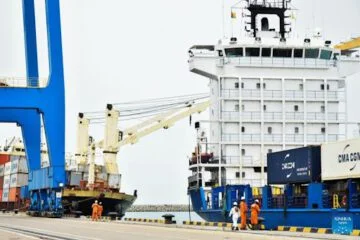The Kribi Deepwater Port in Cameroon, built with the assistance of a Chinese company, has significantly improved the lives of local residents. This vital infrastructure facility has an impressive annual capacity of 250,000 twenty-foot equivalent units and handles 1.2 million tonnes of bulk cargo.
Construction on the first phase of the port began in 2011, and it officially opened seven years later. Ako, a driver at Kribi Port, shared his experience: “I moved to Kribi in 2015. I’ve been working hard ever since. Thanks to the activities at the port, we have food, my children can attend school, and life is good with no issues.”
The transformation of Kribi was unexpected for many. Inspired by the port’s development, more Cameroonians became involved in the ongoing expansion, leading to the groundbreaking of the second phase in 2019.
Eric, a civil engineer, noted, “As the port area develops, many businesses have established themselves in the industrial park, creating numerous jobs for the local workforce. Both young men and women are actively participating in the port’s construction.”
Stephane, a mechanical operator with China Harbor Engineering Company, expressed gratitude for the opportunities provided by the project: “Since I started in 2012, my financial situation has improved significantly, and I’ve gained valuable skills. I appreciate the company’s commitment to local development.”
The Chinese company emphasizes that supporting local communities is a crucial aspect of its operations, and the residents of Kribi are enthusiastic about the project’s progress.
Eric added, “We hope for continued growth, potentially into Phase III, particularly regarding industrial zone development, which would create even more jobs.”
By 2023, the Kribi Deepwater Port had generated around $760 million in customs revenue and created 3,000 direct jobs. The port’s construction has also spurred improvements in nearby road networks, power grids, and other transportation infrastructure.
In addition to the local impact, the port is part of broader initiatives by China to enhance infrastructure across Africa. Since 2013, China has contributed to the development of over 6,000 kilometers of railways, 6,000 kilometers of highways, numerous power facilities, and nearly 20 ports throughout the continent.
This focus on infrastructure development is key to empowering Africa’s industrialization efforts, aligning with President Xi Jinping’s vision for enhanced cooperation between China and African nations.























